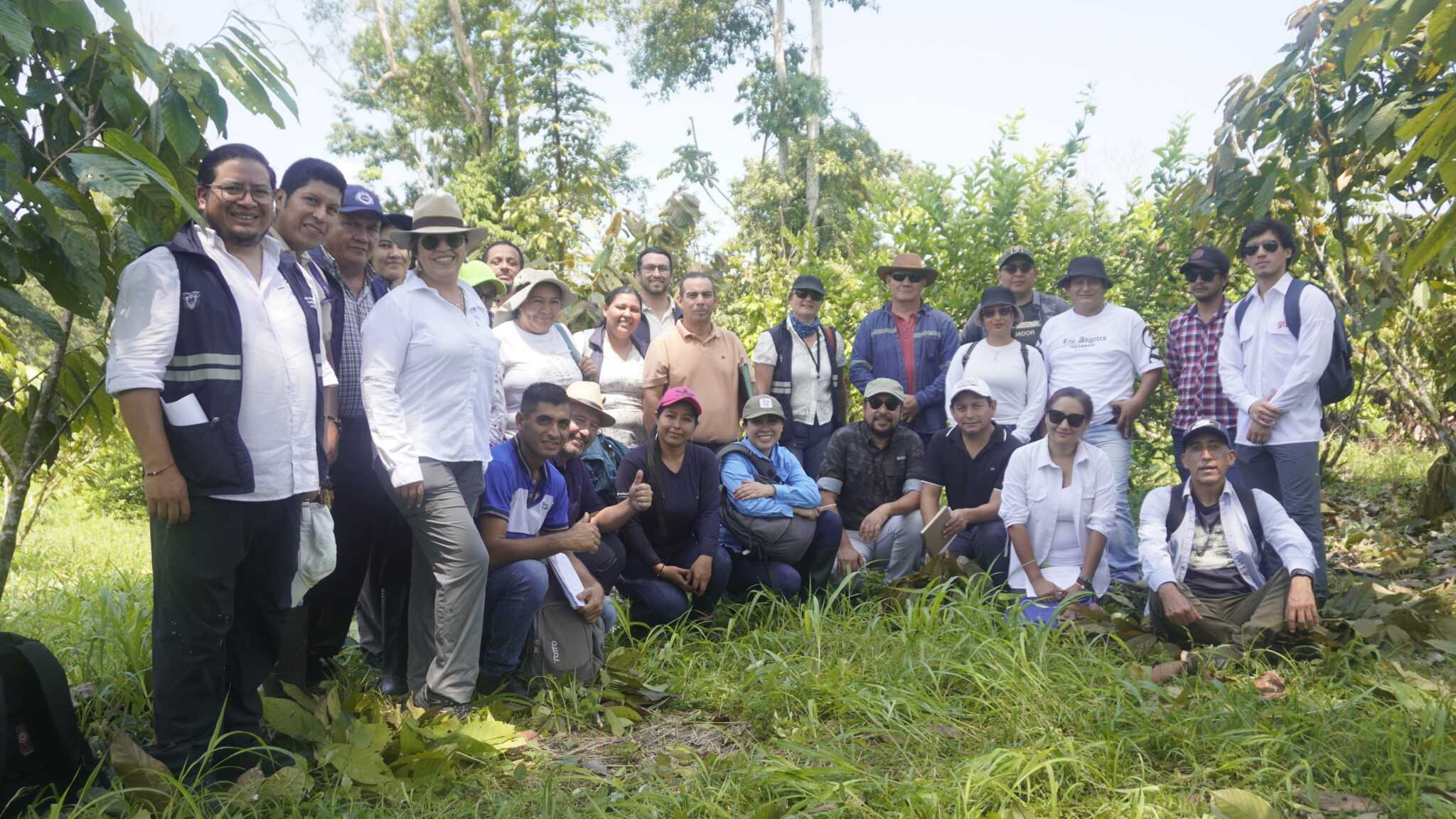QUITO, January 28, 2025 – Nearly one hundred representatives from the public sector, the private sector, academia, and the field of cooperation in Ecuador recently concluded the course on “Training of trainers in traceability and good agricultural and commercial practices for the cocoa value chain”. The aim of the project has been to cooperate with the country to adapt to the requirements of the European Union’s European Union Regulation on Deforestation and Forest Degradation Free Products [EUDR].
The course was an initiative of the country’s Ministry of Agriculture and Livestock [MAG] and the Agency for Regulation and Phytosanitary and Zoosanitary Control of Ecuador [Agrocalidad], in collaboration with the European Union in Ecuador, the SAFE programme of the German Cooperation [GIZ Ecuador], the Cacao Coalition and AL-INVEST Verde.
Speaking at the closing ceremony of the course, Ute Sonntag, The SAFE Programme’s Sustainable Agriculture for Forest Ecosystems Project Coordinator, highlighted the collaborative work on capacity building on traceability for EUDR compliance. “It is a day of recognition, of pride, that so many participants have dedicated themselves to developing key skills to promote these agricultural practices and ensure transparency and traceability in the supply chain,” she said.
Merlyn Casanova, the Executive Director of the National Association of Cocoa Exporters and member of the Cocoa Coalition said, “It [the course] started because of the demands of the European Union and we realised that there was a very important need for more knowledge and to be able to translate that knowledge. “It began with the demands of the European Union and we realised that there was a very important need for more knowledge and to be able to put that knowledge into practice […] There are many actors in the chain and we must work as a group,” she said.
For her part, Rommel Betancourth, Agrocalidad’s General Coordinator for Food Safety, highlighted the efforts of the technical people who were trained. We will work hand in hand with the producers to take responsibility for uploading the information,” he said.
He mentioned the strengthening of the GUIA system, managed by Agrocalidad which will be the fundamental tool to upload the information and be able to meet the due diligence requirements of the EUDR”, in the management of which the people attending the course were trained.
The event was closed by Emilio Calvo, AL-INVEST Verde Component 2 Director, who referred to the continuation of the activities initiated to support the cocoa sector in its adaptation to the EUDR.
He indicated that the goal of this new phase will be precisely to register 30,000 cocoa operators, mainly producers, along with intermediate and exporters, in the GUIA system. This will facilitate the storage of updated sector data and access to the information required in the EUDR.
To this end, activities will continue in the provinces where the course has been held – Guayas, Manabí and Orellana – and the area of intervention will be extended to Esmeraldas, Los Ríos and Santo Domingo. In this way, the main cocoa-producing regions in Ecuador will be included. The aim is to train around 1,800 people, with the support of Agrocalidad.
Some relevant data
The course coordinator, Claudio Marconi recalled that this was a joint effort and pointed out some of the most relevant data. He said that 97 people had taken part – selected from a total of 150 – from the public sector (42 percent), the private sector [42 percent], academia [5 percent] and cooperation (11 percent). 31 percent were women and 69 percent were men. In terms of origin, there were representatives from Guayas [39 percent], Manabí [31 percent] and Orellana [30 percent].
The course has combined theoretical and practical training. This last module was the most appreciated by all participants as they had the opportunity to visit farms and collection centres where they could apply the knowledge acquired. In fact, 89.6 percent consider this training, as well as the selected topics, “very useful”.
“The contents were designed to respond to the current needs of the global market. The programme also incorporated digital tools for the management of georeferencing and practical methodologies adapted to the specific challenges of traceability. The programme also integrated new developments and updates on a daily basis, with relevant and applicable information, directly linked to the standards required by the European Union,” he said.
In conclusion, he emphasised that the course had been given by a multidisciplinary group, which has made it possible to offer comprehensive training beyond the knowledge of the EUDR, and to create a network of experts from the public sector, the private sector, academia, and the field of cooperation. “The creation of this network is a major asset for Ecuador, which should expand it in a pyramidal fashion,” he recommended.
About AL-INVEST Verde
AL-INVEST Verde is a European Union [EU] programme whose main objective is to promote sustainable growth and job creation in Latin America by supporting the transition towards a low-carbon, resource-efficient, and more circular economy. Through Component 2, led by FIIAPP in consortium with IILA, the programme provides assistance for strengthening public policy and multi-stakeholder dialogues on sustainable agricultural and value chains, environmental and labour standards, as well as sustainable trade and economic policy and regulatory frameworks.
Buy your copy of thecooperator magazine from one of our country-wide vending points or an e-copy on emag.thecooperator.news
